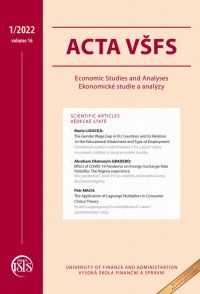Genderové rozdíly v odměňování v EU a jejich vazba na úroveň vzdělání a typ pracovního úvazku
The Gender Wage Gap in EU Countries and its Relation to the Educational Attainment and Type of Employment
Author(s): Marie LigockáSubject(s): Economy, Gender Studies, Education
Published by: Vysoká škola finanční a správní, a.s.
Keywords: educational attainment; EU countries; full-time work; gender wage gap; part-time work; GMM method; Granger casuality
Summary/Abstract: The issue of wage inequality between men and women is widely discussed today. Different developments in individual EU countries characterize different wage values between men and women. As the empirical literature shows, the causes of the gender pay gap are not clear. The paper aimed to examine whether the level of education attained and the type of working hours can affect the value of the gender pay gap in EU countries from 2006 to 2020. Using the GMM method and Granger's causality test, it was possible to find that the selected variables focused on educational attainment and type of employment did not explain any part of the gender pay gap in most cases. These results could be related to the fact that education is available for both sexes practically without significant restrictions. In some workplaces, a minimum percentage of women may be required. The quality of parental leave policy, the daycare system, and the legislative protection of women on parental or maternity leave, which have affected the labor market situation, may be important. These findings indicate that there may be other variables that may affect the values of the gender pay gap in the analyzed regions of the European Union. Granger causality in the opposite direction is attributed to significant labor flows.
Journal: Acta VŠFS - ekonomické studie a analýzy
- Issue Year: 16/2022
- Issue No: 1
- Page Range: 23-42
- Page Count: 20
- Language: English

